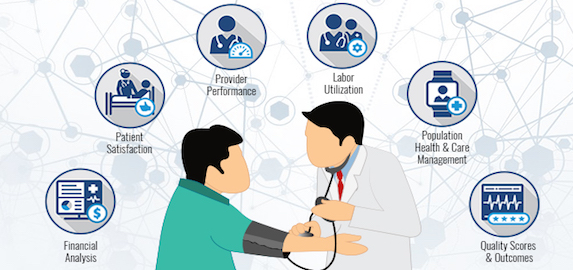The emergence of big data analytics along with advancements in the area of medical science has enabled healthcare companies to gain better insights into the field of therapeutics and diagnostics. This may soon turn out to be a game-changer in the way healthcare services are being delivered in developing countries like India. The integration of statisticians, data scientists, and healthcare firms has helped in structuring huge volumes of data that was earlier untapped to gain insightful information about global healthcare trends. Today, a number of hospitals and healthcare facilitators are coming forward to seek automated management information systems not only in their R&D department but also in the workforce management, accounting, administration, and finance domain.
Application of big data analytics in human and plant genomics, healthcare decision support, patient community analysis are some fields that have great potential to revolutionize the healthcare industry. Big data has a wider scope than common software owing to its ability to capture, process, and manage data in a timely manner. The amount of data processed can range from a few dozen terabytes to many petabytes of information. Several new trends are now a part of the healthcare ecosystem and are gaining popularity all across the globe. Artificial intelligence, being one of them, is helping solve many problems through its AI-based application systems that allow information sharing across several domains. Automation of data storage will allow better access and availability of patient records, thus, bringing in more transparency in the system. In the coming years, the role of the Internet of Things will also become crucial by bringing improved facilities for patient safety and a higher level of operational efficacy. Mobile and wearable devices are now also being used to predict healthcare trends and their forecasts which is essentially trending as the Internet of (Medical) Things. This will again help the care providers to monitor personalized data of patients for better engagement between healthcare firms and patients. In India, the healthcare industry is much ahead of several countries due to higher levels of innovative technologies including AI and machine learning coupled with traditional healthcare practices.

In the healthcare and diagnostics ecosystem, the greatest hazard any patient takes when admitted to a healthcare facility is being analyzed by another human. Missed cautioning signs, disregarded hazardous factors and superficial evaluations are regularly an integral part of boisterous admission wards. This is the reason, human services suppliers are switching to PCs to enable them to settle on brisk and precise choices about patients’ well-being. Innovative solutions like in-house diabetes monitoring, smart devices such as smart toothbrushes, smart toilets, and smart scales that are capable of instantly reporting on a patient’s condition are one of the many exciting opportunities in this sphere that are creating a buzz across the globe. Through the power of big data, doctors would also be able to reduce readmissions by keeping track of specific treatment factors that may lead to the recurrence of ailments; thus saving both time and money for the doctor and patient. In the future, this may further allow point-of-care decision-making that will enable doctors to make quick, life-saving calls at point-of-care through the use of tools with inbuilt data processing capability.
Big data applications in the field of data analytics which can disrupt the healthcare sector in developing nations can be emulated from the below classic milestones:
- IBM predicts a 20% abatement inpatient mortality rate as the medicinal field gears to dissect streaming patient data with large-scale software applications. Indeed, even now, significant organizations like Microsoft, Dell, IBM, and Oracle are spearheading information mining stages that will enable medicinal experts to stay atop patient information and offer enhanced medical care.
- Google Flu Trends: a service that predicts and locates outbreaks of the flu by making use of information aggregate search queries.
- The San Francisco-based Global Viral Forecasting Initiative (GVFI) utilizes propelled information investigation on data, mined from the Internet to recognize thoroughly the areas, sources, and drivers of local outbreaks before they wind up as global epidemics.
- IBM, through the launch of ‘Smarter Cities’ initiatives, has support home care of chronically ill patients (e.g. Stavanger Hospital in Norway)
- Accenture focuses on the 4% chronically sick patients that tie up over 60% of the healing center assets through an administration that screens the constantly sick patients who can live at home, avoiding readmission to doctor’s facility.

A large number of these conceivable outcomes are as of now being actualized, however, a few potential outcomes are somewhat more remote off. In any case, it seems promising to consider that the collection of tremendous amounts of information can and will profoundly affect lives spared and enhanced by medical technology.
Blackcoffer Analytica: Puloma Singh, Rishika Sarin, IMI, New Delhi














